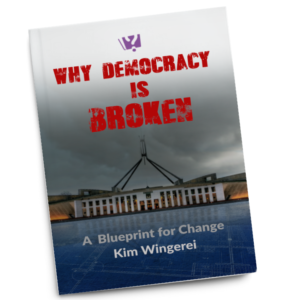Listen to “The ACCC takes on the Internet giants – part one” on Spreaker.
Click play for Podcast.
The ACCC digital platform inquiry is a mixture of some real reform suggestions and the usual tinkering around the edges of a flawed regulatory regime. It is a step in the right direction, but short on vision and devoid of courage to take the lead.
In a recent ruling the US Federal Trade Commission (FTC) fined Facebook U$5 billion for the negligence that led to the Cambridge Analytica scandal back in 2016. According to the Washington Post the FTC wanted a much bigger fine but was advised against it because they wouldn’t stand a chance against the bottomless pockets of Facebook’s legal team. On the day that the fine was announced, Facebook stock rose. With more than U$50 billion in current assets (cash and cash equivalents) and annual net cash flows of U$15 billion (2018), with a market cap of U$550 billion, U$5 billion has little impact on Facebook’s business, nor on its shareholders.
Google was also recently fined U$1.7 billion by the EU for abusing its online advertising market power; the last in a series of fines including an “antitrust” fine of around U$3 billion in 2017. With current assets of U$136 billion paying the fines was similarly unlikely to deprive CEO Larry Page of much sleep.
Granted, these fines also come with enforced regulatory changes which will have some deterrent effect on behaviour. But for big business doing the “right thing” is not just a question of ethics and morals, but subject to a cost-benefit analysis. I have spent enough times working in large corporates to have seen first hand that “better asking for forgiveness than permission” is more than just a throwaway line.
In what some have dubbed a local assault on the market power of Facebook and Google, our own ACCC issued the long awaited final report from its 18 month “Digital Platform Inquiry” last week. It is a document long on rhetoric (all 623 pages of it) and short on recommendations to dent the massive market power of the search and social media behemoths.
Google and Facebook occupy more than 50% of the time Australians spend online, according to the report. Between them they collect almost a third ($5.2 billion) of all advertising revenue in Australia ($16.2 billion in 2018).
Online advertising’s market-share has grown from virtually zero in just 15 years and this growth is almost entirely at the expense of print media. In 2003 print media advertising was worth $8 billion, in 2018 it was worth around $2 billion (inflation adjusted), a loss of $6 billion of which the newspaper companies have only re-gained approx. $2 billion (20%) of the online market.

Courtesy – ACCC Digital Platform Inquiry Report – 2019
This shift of revenue has led to the decline in profits and reduced the number of journalists employed by print media by 20% from 2014 to 2018 – which in turn is one of the reasons we appear to have less diversity and less quality newspapers. It is also one of the reasons Murdoch’s News Limited’s influence is on the vane, not that there is anything wrong with that.
But if the mainstream media had hoped the ACCC would address their plight with sweeping reforms, they have been disappointed. Of the 23 recommendations in the report only a handful relates to how online news delivery impacts on news dissemination.
Recommendation 9 states that “Stable and adequate (sic) funding should be provided to the ABC and SBS in recognition of their role in addressing the risk of under-provision of public interest journalism that generates broad benefits to society.”
Recommendation 10 suggests public funding via the “Regional and Small Publishers Jobs and Innovation Package” should be from $20 million to $50 million per year. Commendable and useful, of course, but together with recommendation 11, which suggests changed “tax settings to encourage philanthropic support for journalism”, and 12 and 13, “Improving digital media literacy in the community and in schools”, these are suggestions that are unlikely to make any measurable difference to the imbalances the ACCC report depicts.
Recommendation 6, however, is as self-evident as it is a decade overdue – paramount, nevertheless. It refers to the “process to implement a harmonised media regulatory framework”.
This is an important reform and should underpin many of the other recommendations related to code of conduct (7, 18), copyright enforcement (8) and dispute resolution (22,23).
Much of the regulatory framework for content publication and distribution is already in place but needs to be applied to different technologies. YouTube (owned by Google) and Facebook (and Netflix, etc.) need to be responsible and accountable for the video content they distribute in the similar ways broadcast television is today, and subject to much the same rules and regulations.
The use of the internet as the distribution mechanism instead of television spectrum or cable is merely as a technicality. We should not need to reinvent the regulatory wheel every time technology changes. This doesn’t just apply to video content. Podcasts are just unscheduled radio, online publications are just print without ink. We already have copyright laws, privacy regulations, defamation laws and ombudsmen that deal with many of these issues the ACCC report raises. It is time we took a wholistic approach.
That said, digital platforms do represent many unique challenges due to the complexity, speed and sheer magnitude of content they distribute. Reuters 2019 Digital News Report states that 33% of news consumers access it primarily via social media, 57% using search engines or news aggregators such as Google News. Only 30% goes direct to the websites of the news sources.
As the ACCC report points out, Facebook, Google and the other social media giants don’t see themselves as publishers and don’t take responsibility for the content that passes through their platform. This has in effect enabled not just the proliferation of “fake news”, and – as demonstrated by Cambridge Analytica – the surgically targeted distribution of news stories deliberately produced to influence opinions in general and elections in particular.
The ACCC acknowledges that this is a global issue and cannot be regulated in isolation in Australia. I would argue that this is an abrogation of its responsibility. Fake news has been around since humankind invented religious dogma, but the intersection of opinion peddlers and the break-down of privacy by the advent of “big data” is now a threat to democracy. The ACCC should not be afraid to pave the way.
The EU’s General Data Protection Regulator (GDPR) is a good start, but it is not going far enough. Firstly, we need to amend broadcasting and publishing regulation to encompass digital distributors, including considering licensing of video content in ways that make Facebook, Google (YouTube) and others responsible for their content, just as ABC, Channel Nine, SBS and others are.
Similarly the digital giants should be made responsible for all the content on their platform including made accountable for content that break Australian laws. Self regulation, codes of conduct, more regulatory bodies and a regime of take down notices and other reactive measures are not enough.
The ACCC report alludes to stronger data privacy and giving control back to the consumers, much in the same way as the GDPR does. But these are measures that addresses the symptoms of the problem, not the causes.
The fundamental cause is that we as consumers have done a deal with the devil by getting to gauge on all this free and wonderful content in return for giving away our privacy.
Why not demand that Facebook et al. establish an impenetrable wall between the data that identifies us and the meta-data that profiles our behaviour? The former belongs to us and is not for sale, the latter is a commodity but should have a price and be an opt-in, not an opt-out as is the case today.
Facebook and Google and their lesser brethren are not – as some will have it – essentially evil or instruments of oppression. But they are immensely rich and powerful and must be held to account. Licensing and privacy regulations as outlined will cost them lots of money. Money earned by advertising to us and selling our data. I would rather see them spend billions of dollars to protect our consumer rights, than paying massive fines that benefits nobody but lawyers and the state, national or international body that collects them.
As was evident in the 2016 US Presidential election, it is our democracy that is under threat.





